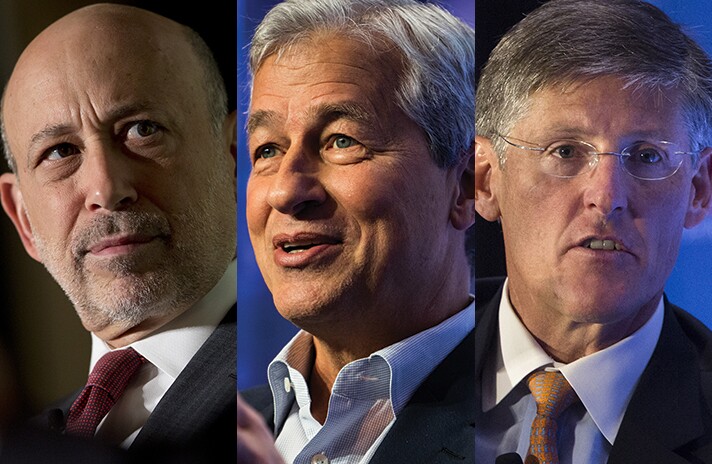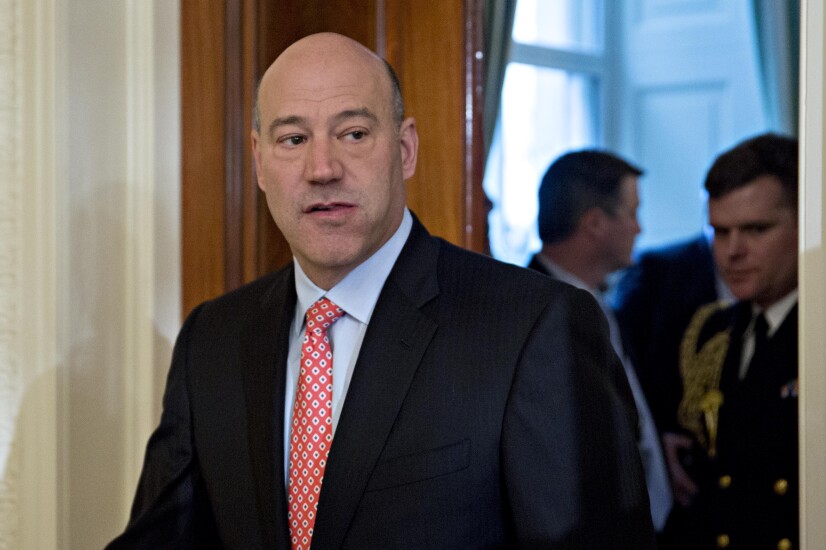
Why bank CEOs are speaking out on guns, DACA and global warming
But times are changing. CEOs such as JPMorgan Chase’s Jamie Dimon, Bank of America’s Brian Moynihan, Citigroup’s Michael Corbat and Goldman Sachs’ Lloyd Blankfein are now taking stands on big, public-policy issues in part because key stakeholders expect them to.
Many employees — especially millennials — prioritize working for firms that are committed to workplace diversity and are seen as caring about the environment. And many of today’s socially conscious investors are demanding that banks limit their exposure to industries that they believe are causing societal harm, no matter how profitable the relationships with, say, gun manufacturers and coal-mining firms might be.
The election of Donald Trump as president has only raised the level of CEO activism. While these captains of industry have supported much of Trump’s economic agenda — tax cuts and regulatory relief, in particular — they have been deeply troubled by the president’s refusal to denounce white supremacists, his equivocation on gun violence, his rejection of climate science and his stance on immigration.
To be sure, there are economic arguments to be made for some of the positions bank CEOs have staked out. For example, shortly after Trump took office and issued an executive order to ban immigrants from certain predominantly Muslim countries, Blankfein said in an email to Goldman Sachs employees that, for the firm to be successful, “our men and women must reflect the communities and cultures in which we operate."
Still, no matter what is driving them, bank CEOs of today are seemingly more willing than their predecessors to take principled stands on controversial topics. Here are some examples from the past 24 months.

'Initiating a dialogue' on gun violence
That is prompting some banks to takes steps of their own to try to minimize gun violence. Citigroup was the first big bank to do so when it said in March that it will require its customers in the firearms industry to
Bank of America followed suit in April when it announced that it will
In a memo to employees, Citigroup CEO Michael Corbat, above, called on the banking industry to work together to help keep guns from getting into the wrong hands.
“We know that our efforts cannot lead to real change unless we work with others,” Corbat said in the memo. “To that end, we are initiating a dialogue within the financial services industry and with other stakeholders to understand whether there are additional technology solutions or voluntary standards that can be enacted.”
Some banks, though, are resisting such overtures. Wells Fargo, which has been described as the
“We don’t think it’s a good idea for banks to decide what products and services Americans can buy,” Wells Fargo CEO Timothy Sloan said at the bank’s annual meeting in April. “It should not be up to me, to us, to decide that. It should be up to folks following the laws and folks making decisions.”

Fearing a setback on global-warming fight
PNC Financial Services Group, for example, has been scaling back its lending to coal-mining firms for a number of years and in 2015 said it would
Many large banks, too, have been making significant strides in reducing their own carbon footprints, so some CEOs could not hide their disappointment when President Trump said that the U.S. would be exiting the Paris pact as soon as it can.
“Today’s decision is a setback for the environment and the U.S.’s leadership position in the world,” Goldman Sachs Chairman and CEO Lloyd Blankfein said in a rare Twitter post in June of last year.
JPMorgan Chase Chairman and CEO Jamie Dimon, above, had a similar reaction, saying that he “absolutely disagreed" with the move.
A fews weeks later, JPMorgan doubled down on its sustainability efforts, announcing commitments to dramatically reduce energy consumption in its offices and branches by 2020 and pledge $200 billion in financing for wind farms and other renewable-energy projects over the next eight years.

Immigration: 'Being diverse is not optional'
“This is not a policy we support,” Blankfein, above, bluntly said in a January 2017 memo to employees shortly after the president first proposed banning immigrants from seven Muslim nations.
He argued that an immigration ban is not just bad policy, it’s bad for business. Banking is an industry that prides itself on its diversity and Blankfein told employees that for Goldman Sachs to succeed "we must attract, retain and motivate people from many backgrounds and perspectives.
“Being diverse is not optional; it is what we must be,” he said.
Bankers have also condemned Trump’s proposal to end the 6-year-old DACA program, which allows young, undocumented immigrants who came to the U.S. as children to live and work here without fear of deportation. If the Trump administration makes good on its threats to phase out DACA, roughly 800,000 young adults — some of whom are now working in financial services — could eventually be forced to leave the country.
It remains to be seen how far the Trump administration will get in advancing its policies on immigration; so far, efforts to end DACA and impose an immigration ban have been blocked by the courts.
There’s little question, though, that the uncertainty surrounding the program can be problematic for U.S. companies. Just last week, Bank of America
President Obama established DACA by executive order in 2012, and BofA Chairman and CEO Brian Moynihan has been among the business leaders who have urged Congress to end the uncertainty by enshrining DACA, or some version of it, into law.
“The individuals covered by the terms of this program live in and contribute to the neighborhoods and communities across our country that we serve every day,” Moynihan said in September, when the president first proposed ending DACA.

Charlottesville: 'No room for equivocation'
But the white supremacist rally in Charlottesville last year, in which one person died, represented a breaking point.
Advisory councils to the president made up of prominent CEOs hastily disbanded in August after Trump refused to condemn the organizers of the white supremacist rally.
Dimon, who served on one of the councils, said that Trump’s comments blaming “both sides” — the other being people on hand to protest the rally — for the violence was “unacceptable.”
"There is no room for equivocation here,” Dimon said in a memo to his staff. “The evil on display by these perpetrators of hate should be condemned and has no place in a country that draws its strength from our diversity and humanity.”
No business leader was more visibly pained by Trump’s comments than the president’s own director of economic policy, former Goldman Sachs President Gary Cohn, above.
“Citizens standing up for equality and freedom can never be equated with white supremacists, neo-Nazis, and the KKK,”
Cohn faced intense pressure at the time to resign but said he wouldn’t because he would not “allow neo-Nazis ranting ‘Jews will not replace us’ to cause this Jew to leave his job." He ultimately stepped down in March, reportedly in protest of the president’s decision to impose tariffs on steel and aluminum imports.

Playing a role in repeal of N.C.'s 'bathroom bill'
The so-called “bathroom bill” was championed by religious conservatives but panned by business leaders who correctly predicted that its passage would harm the state’s economy. Indeed, not long after it was signed into law, PayPal dropped its plans to build a second headquarters in Charlotte; the National Basketball Association relocated its 2017 all-star game, scheduled to be played in Charlotte, to New Orleans; and numerous entertainers, including Bruce Springsteen, canceled events in the state.
Among the law’s most vocal opponents were two of the state’s biggest employers, Bank of America and Wells Fargo. Wells, which in 2014 ran the industry’s first
Moynihan, above, echoed those comments and said that as long as the law remained in place, North Carolina would continue to face boycotts and lose jobs to rival states.
The law was partially repealed last year, in no small part due to the activism of the business community. Bank of America played a particularly important role in that effort, with two of its top executives, Chief Administration Officer Andrea Smith and North Carolina market president Charles Bowman, serving on the task force that brokered a compromise.





